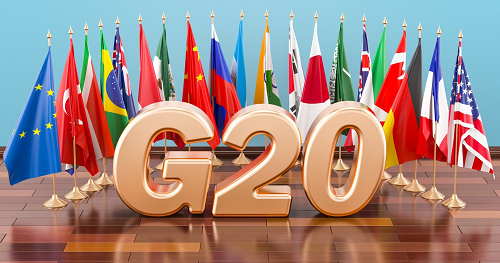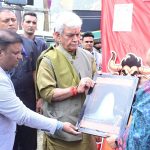Manufacturing presents one of the biggest and the most transformative opportunities for India to reach the ambitious, yet achievable, target of becoming a USD 30-trillion economy by 2047. India’s massive and skilled workforce, an emerging supply base, localized access to natural resources, entrepreneurial capabilities and a strong domestic market makes it an attractive manufacturinghub.
Some of the current emerging trends in industry comprises of: Tech-enablement of manufacturing (Industry4.0), reconfiguring production with focus on IoT, 3D printing, advanced robotics, artificial intelligence, virtual and augmented reality. Besides, there is increased emphasis on servification of manufacturing, encouraging Sustainability: Green incentives, improved waste management, building a circular economy; adoption of Environmental, Social and CorporateGovernance (ESG) ratings and Goals. Higher integration with Global ValueChains remains a critical part of this process especially in the post pandemic scenario.
It is in this context that India’s G 20 presidency plays a key role in highlighting major issues, given the current geopolitical and geo- economic scenario. India’s presidency can help voicing the concerns of global south, focus on issues relating innovation, sustainability and creation of knowledge frameworks, along with, encouragement of current emerging trends gaining ground in the existing Industrial milieu, promotion of digital public goods and enabling access of open source digital infrastructure across all strata of society and for all countries.
The Group of Twenty (G20) is the premier forum for international economic cooperation. It plays an important role in shaping and strengthening global architecture and governance on all major international economic issues. The Group of Twenty (G20) comprises 19 countries (Argentina, Australia, Brazil, Canada, China, France, Germany, India, Indonesia, Italy, Japan, Republic of Korea, Mexico, Russia, Saudi Arabia, South Africa, Turkey, United Kingdom and United States) and the European Union. G20 members represent around 85% of the global GDP, over 75% of the global trade, and about two-thirds of the world population. The G20 Presidency steers the G20 agenda for one year and hosts the Summit. India’s invitees are: Bangladesh, Egypt, Mauritius, Netherlands, Nigeria, Oman, Singapore, UAE and Spain (permanent invitee).
India holds the Presidency of the G20 from 1 December 2022 to 30 November 2023. Drawing inspiration from its G20 Presidency theme of ‘Vasudhaiva Kutumbakam’-‘One Earth One Family One Future’.
Business 20 (B20) is the official engagement group of G20 created in 2010 under the Canadian presidency, with the aim to galvanize global business leaders for their views on issues of global economic and trade governance and speak in asingle voice for the entire G20 business community. This engagement group conducts work through various task forces, the recommendations of which are summarized at the B20 Summit and presented to the G20 leaders prior to the G20 Summit.
Under India’s presidency the work of the B20 is to be conducted through seven
(7) task forces and two (2) action councils, namely
Taskforces:
- Inclusive GVCs for Resilient Global Trade and Investment.
- Future of Work, Skilling, and Mobility.
- Energy, Climate Change and Resource Efficiency.
- Digital Transformation.
- Financing for Global Economic Recovery.
- Tech, Innovation and R&D.
- Financial Inclusion for Economic Empowerment.
Action Council:
- ESG in Business.
- African Economic Integration.
A series of events including the subject-specific task force meetings with participation from businesses, policymakers, experts, and international diplomats are to be held as part of this agenda. Around 100 meetings and events, both hybrid and in-person have been planned across India and overseas under India’s Presidency. B20 Inception Meeting is to be held in Gandhinagar in January, 2023.
With a motto of ‘RAISE’-Responsible, Accelerated, Innovative, Sustainable and Equitable Businesses, B20 India would be an important forum for discussions and deliberations on various issues as climate action, innovation, digital cooperation, resilient GVCs, and financial inclusion. Start-ups have become the engine for innovation-fuelled economic recovery, reorientation, and growth. The Start-up 20 Engagement Group, being initiated under India’s presidency of G20, aspires to create a global narrative for supporting start-ups and enabling synergies between start-ups, corporates, investors, innovation agencies and other key ecosystem stake holders. The primary objective of the new engagement group is to develop an inclusive framework to support innovative start-ups, through strategic collaboration across the G20 nations.
Given this entire perspective, some of the key initiatives assuming center stage are:
- Emphasis on Digitalization and industry 4.0. Businesses need to discuss global issues related to development and optimization of GVCs to intensify participation in global markets and export diversification by businesses. It
Is important to shape the future of GVCs in a sustainable and inclusive way to enhance economic growth and improve business competitiveness.
- Ways to create employment at scale aligned to the jobs of the future and Action plan for reskilling and upskilling of the workforce to operate in aworld focusing on adoption of advanced technologies.
- Accelerating financing for economic recovery, particularly encouraging support towards MSMEs.
- Boosting efforts towards debt servicing and facilitating funding support for most vulnerable economies.
- Promoting financial inclusion amongst the G20 countries, particularly through digital financial services.
- Sharing best practices from strategies focused on the digitalization of financial services.
- In addition to environmental imperatives, priority would be given to sustainable, balanced and inclusive investment, balancing social and economic imperatives, keeping in mind the local and regional context.
All above mentioned initiatives/ objectives require collective and coordinated efforts amongst all G 20 nations, to take concrete steps in the post Covid World.While all countries are focusing on taking optimal steps for Post Pandemic recovery of their economies, the necessity of looking at collaborative and combined efforts for working towards synchronized and synergized economic development across nations, imbibing the principles of collaboration and cooperation assume critical importance.
With India’s emphasis on world as One Family, as a corner stone of its Presidency, it is time to look forward to adoption of sustainable and positive steps enabling economic development across all countries and all income groups within a country.
(The Author is Principal Adviser, Department for Promotion of Industry and Internal Trade (DPIIT), M/o Commerce and Industry)








